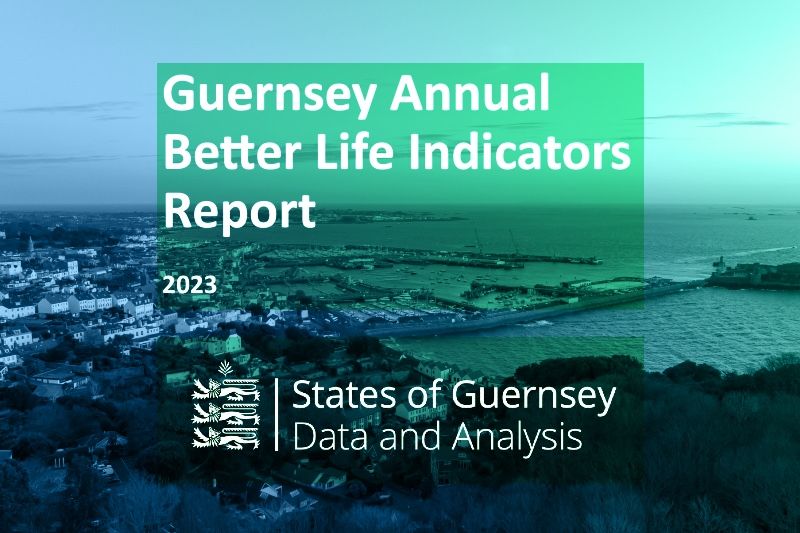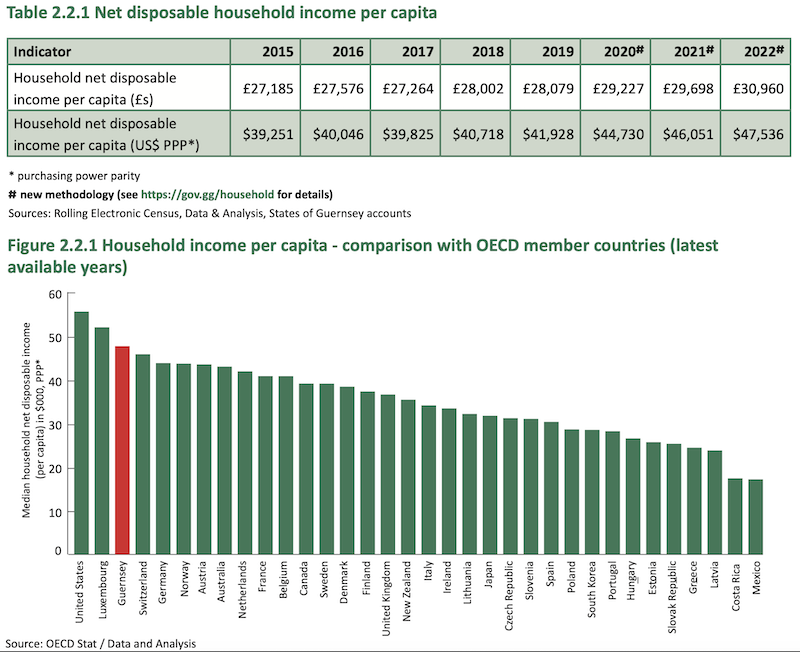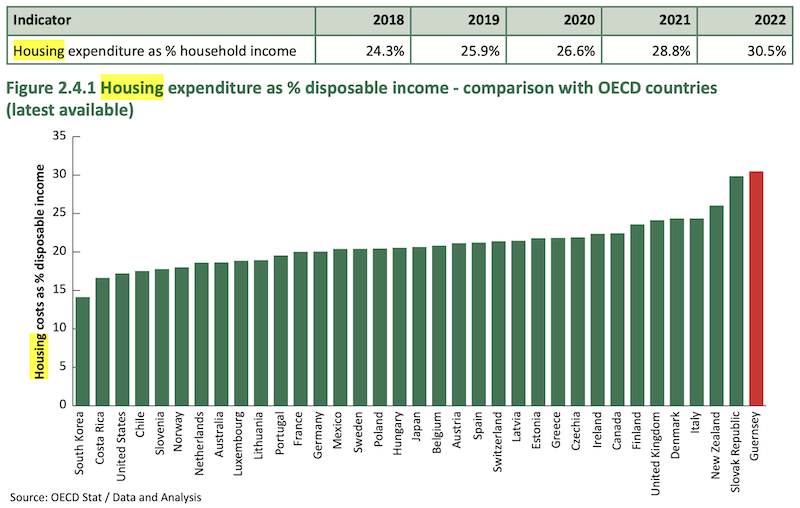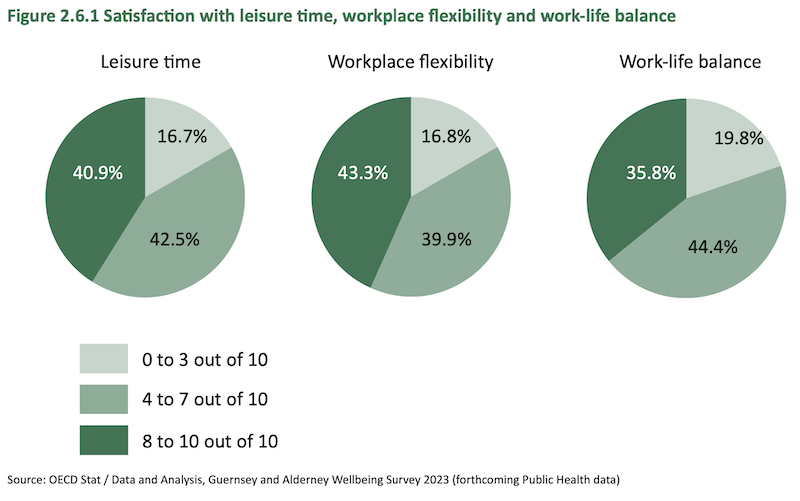


The latest 'Guernsey Annual Better Life Indicators Report' landed on our desk earlier this week, with a mixed bag for the Bailiwick to digest. Little to surprise maybe, but some interesting statistics nevertheless...
The report outlines Guernsey's use of the OECD's Regional Wellbeing framework and Better Life Index to assess the living conditions of islanders. The framework, which considers factors beyond economic growth, aims to provide a comprehensive picture of our wellbeing across various dimensions.
The OECD Better Life Index comprises 24 measures over eleven dimensions of wellbeing: income, jobs, housing, health, safety, civic engagement, community, education, environment, life satisfaction, and work-life balance.
Guernsey has fully comparable data for nine of these 24 measures, having adapted the OECD framework to monitor government performance in achieving its 20-year vision for the island. This aims to support ongoing policy planning and decision-making within the States of Guernsey.
The Homicide rate is one of the official measures used in the Better Life Index but homicides are rare in Guernsey.
This metric is weighted per 100k population and Guernsey sits at the very bottom of the listed countries.
The report also measures other areas where the Bailiwick does well, including how safe people feel at night, walking alone.
“The percentage of adults who feel safe walking alone after dark is also measured. The results are not totally comparable with the OECD measure, as the questions were worded differently.
“The 2023 Wellbeing Survey found that 74.6% of the population (aged 16 or over) felt very safe or fairly safe walking alone after dark, 15.1% felt neither safe or unsafe and 10.3% felt fairly unsafe or very unsafe. The OECD question on this topic required a yes or no response, with average results of 75% saying that they did feel safe and 25% saying that they did not feel safe."
Employment is another area where Guernsey shines.
The Long Term Unemployment rate is the number of people who have been unemployed for a year or more divided by the total labour force ie the total number employed and self-employed or seeking work. Both the employment and unemployment measures are good measures of the health of an economy and engagement of the population in its economy.
During 2023, an average of 0.59% of Guernsey’s workforce had been unemployed for 12 months or more. This number puts Guernsey in good stead compared to the other jurisdictions, however, it also highlights a trend that should be monitored.
That number was as low as 0.19% in 2016, and 0.13% in 2019. Data collation stopped during the covid-19 lockdowns, but once they resumed the 2022 numbers shot up to 0.48% and it's continuing to increase.
“The OECD’s “How’s Life?” report also considers the number of young people not in employment, education or training. There are many reasons why young people may not be in employment, education or training, and not all the reasons constitute deprivation (e.g. taking a gap year or volunteering). Additionally, in Guernsey, if a young person is at university but has not applied to the States of Guernsey for a grant, there is no government record of their attendance and they will not be included as “in education”.
This number of NEETS in Guernsey is relatively low, as it always has been.
According to the data provided by the states it’s been fluctuating around 1% for the last decade, with 2020 and 2021 the exceptions, when it rose to 2.0% and started to shrink back down, to it’s current level of 1%.
However there are other caveats when it comes to the employment rate in Guernsey.
Unlike many of the jurisdictions on the list, Guernsey has a seasonal worker shift pattern, with more workers on the island during the summer months. The States confirmed this is partly responsible for Guernsey’s success in comparing employment figures.
“Guernsey’s economy enjoys high employment participation and low unemployment rates. Guernsey is able to sustain low unemployment rates, in part, by allowing the expansion of the workforce to meet the demand for labour by bringing in workers from outside the island. This practice is particularly evident in highly seasonal sectors like hostelry. This allows the workforce to expand and contract while placing less pressure on participation and unemployment rates. This pattern allows Guernsey to sustain significantly lower unemployment levels than are typically seen in larger jurisdictions while still meeting the demands of employers for skilled labour.”
Earnings and Household Income are other good stories for Guernsey, on the surface at least. Boasting a high median wage of £41,564, a number which has been creeping upwards year after year. However, it’s important to note that the island does not record data in the same way as the OECD:
“Guernsey’s median average earnings figures do not take hours worked into account and so relates to all employees, including those working part-time. This is different to the OECD figures, where hours worked are also taken into account, giving full-time equivalent earnings. Plans are being developed to improve Guernsey’s data in this area.”
“The “Jobs and earnings” section of the OECD Better Life Index also includes the indicator: “Labour market insecurity”, which looks at the expected earnings loss, measured as the percentage of the previous earnings, associated with unemployment. This is not measured in Guernsey.”
Household Income is another category that Guernsey doesn’t do too badly in, scoring high and coming third on the table, below the United States in first, and Luxembourg.
It represents how much money a family has available to spend after taxes. It shows how well people can afford basic necessities. The report uses "net disposable income per capita," which means it divides the total income of a household by the number of people living there, after considering taxes and social security contributions but before housing costs.
“Household income in Guernsey is fairly high relative to many comparator jurisdictions, reflecting low levels of unemployment and a high level of employment in sectors with a high level of added value.”

Pictured: When it comes to disposable income, Guernsey is in the upper tiers.
Last on the list of true successes come Life Expectancy and Health, two indicators which Guernsey has done well in.
Life expectancy is staying steady. It’s been on a slow creep upwards since a low in 2016 of 82.6 years old, as a maximum life expectancy since birth, that’s now reached 83.4 but has bounced between that figure and 0.1 year less since 2018.
“Life expectancy may indicate the level of access to health services in a region. The life expectancy at birth for Guernsey is presented as a three year rolling average ending in the year indicated, due to the relatively low size of the population in Guernsey. Long life expectancy is generally associated with high living standards. Factors such as the quality of sanitation, diet, health care, working conditions and community support services all contribute to longer life expectancies.”
Whilst when it comes to health, the Guernsey and Alderney Wellbeing Survey 2023 surveyed more than 2,300 residents to assess their general health.
A significant majority (73.2%) reported good or very good health, exceeding the OECD average of 67.5%. This positions Guernsey 11th out of 34 OECD countries.
On the surface, Guernsey does remarkably well in Voter Turnout, a key metric for the OECD. Guernsey placed 8th out of 39 countries for this measure, with a figure of 80%. It’s measured and held with regard in these reports as it gives an indication of the public’s trust in government and of their willingness to participate in their own governance.
However as countries have differing ways of dishing out their democracy, it gets a little lopsided potentially, and the report highlights this.
“Voting is compulsory in some countries (such as Australia), with varying degrees of enforcement. In Guernsey you need to be eligible to vote and put yourself forward to be included on the electoral roll to have the right to vote in an election, whereas inclusion on the roll is automatic in other jurisdictions.”
“If we look at the people that voted in the 2020 Guernsey election as a percentage of all the eligible people, the figure reduces to 50%.”
If 50% was the recorded metric, this would put Guernsey near the very bottom of the list with Switzerland and under Chile.
Housing and Housing Maintenance both deserve a little attention too. The figures show that there are 1.1 beds for every person in Guernsey. This is a good stat, but with the 2024 seeing cause for concern over homelessness, sofa surfing and housing demands, it begs so many questions including how can Guernsey have people at risk of homelessness when there are enough beds going spare?
“Housing expenditure, defined as expenditure by households on housing and maintenance (includes housing, water, fuel, furnishings, household equipment and routine maintenance of the house) expressed as a percentage of net disposable income is an indicator of household wellbeing. Guernsey’s housing costs are high compared with the OECD countries, meaning that households in Guernsey have to spend relatively more of their budget on housing.”
For these costs Guernsey comes plum last, and by quite some margin too.
It’s important to note, this data was before the most recent waves of supply chain issues and price increases. They come from 2022, and show that almost a third of income is spent on Household expenditure.

Pictured: Guernsey spends more on housing costs, as a percentage of income, than any of the comparable nations and countries on the OECD Index.
Community Connection is one area that could raise an eyebrow or two.
We’re a small island where everyone knows everyone and we all live relatively nearby to family members or friends. You’d expect this community connection to be high, especially with slogans of 'Island Life' and themes of 'locality'. However Guernsey finds itself at the more unfortunate end of the spectrum, sat near the bottom under Poland but above Mexico, however there are yet again more caveats to consider, such as a difference in the style of questioning to receive the data.
“One of the questions in the 2023 Wellbeing Survey asked about perception of the respondent’s social network - did they feel they had plenty of people they could rely on when they had problems? 84% thought they did have people they could rely on, which is a lower percentage than many OECD countries. It should be noted that the question was worded slightly differently in the OECD surveys - “If you were in trouble, do you have relatives or friends you can count on to help you whenever you need them?”
Life Satisfaction stands out, as although Guernsey’s recorded lower scores in other categories, surely the real metric of a 'Better Life' report would lay here.
Guernsey drops to just 6.7 out of 10 for satisfaction. However the States suggest that this is again due to a difference in questioning.
“One of the questions in the survey asked people to evaluate their life satisfaction on a scale of 0 to 10. This self-reported indicator of wellbeing shows how people feel about their lives and is comparable with the OECD indicator.”
“The average life satisfaction score was 6.7. This question was also asked in previous Wellbeing surveys, as well as the Community surveys in 2020 and 2021, but was worded differently, with respondents asking to score their life satisfaction on a scale on 1 to 8, so the results are not comparable.”
If you look at the work life balance section you can clearly see there are many who are feeling unsatisfied with their lives in Guernsey, with crushing housing costs, a community connection slipping away, and other factors laid out as evidence in the report.
The average score for satisfaction with leisure time was 6.5 out of 10, for workplace flexibility it was 6.4 and for work-life balance it was 6.1.

Pictured: Guernsey scored well for Leisure Time and Workplace Flexibility, however a significant portion of islanders are unsatisfied with their work/life balance.
You can find the full report available online on the States of Guernsey website HERE.
Comments
Comments on this story express the views of the commentator only, not Bailiwick Publishing. We are unable to guarantee the accuracy of any of those comments.